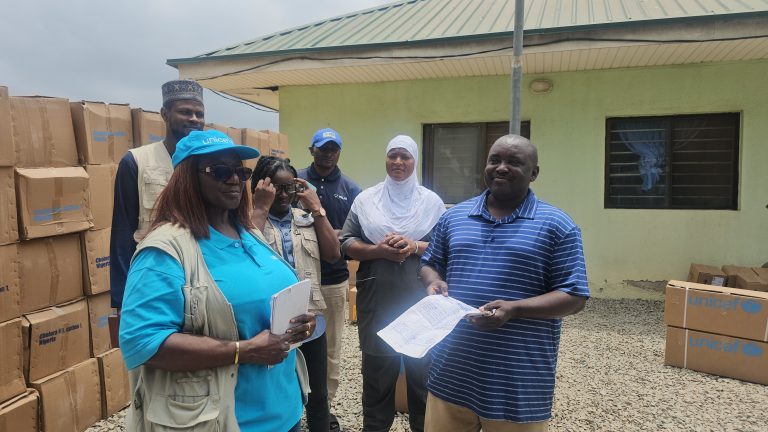The United Nations Children’s Fund (UNICEF) has raised alarm that the high rate of open defecation in Niger State is fueling cholera outbreaks.
Just as the organization delivered critical medical and sanitation supplies to the state to support ongoing response efforts.
During the handover at the Chanchaga Cholera Isolation Center in Minna, UNICEF’s Water, Sanitation, and Hygiene (WASH) Specialist, Teresa Fama, revealed that 46 per cent of households in Niger State lack toilets, leaving human excreta to wash into rivers, open wells, and other water sources.
This, she warned, is the biggest driver of the disease urging households to build toilets, wash hands regularly, and treat all drinking water.
“Cholera comes when excreta contaminates food and water. If every household in Niger State had a toilet, cholera would not spread the way it does. The absence of toilets and the use of unprotected water sources are putting lives at risk.”
The warning comes as 27 patients remain on admission in treatment centers across Munya, Wushishi, Boso, and Chanchaga local government areas.
At the Chanchaga cholera isolation unit alone, seven patients were being treated, with four confirmed positive for cholera.
To support the state’s response, UNICEF delivered seven categories of supplies, including 350 cartons of cholera kits, water purification tablets, community and peripheral health kits, glucose drips, and basic sanitation materials, with 10 drums of chlorine expected to arrive soon.
Fama stressed that unsafe water practices compound the problem citing the 2021 WASH Norm survey, which found that 91 per cent of Niger State residents consume water contaminated with E. coli, a dangerous indicator of fecal pollution.
“There are people that are still drinking water from unprotected wells. Some are drinking from rivers. We still have people that use vegetables that may have been harvested from farms where they use human excreta as fertilizer. That’s another dangerous practice.
“We also have water vendors that sell water and nobody cares where the water comes from. Some of that water comes from contaminated sources. And that is part of why we still have cases that have been reported”, she said.
Deputy State Disease Surveillance Officer, Uriah Mahmudu, who received the supplies on behalf of the state Ministry of of Secondary and Tertiary Health, said they would be distributed to patients and affected communities to curb the spread.
“After treatment, discharged patients go home with hygiene kits, and we also take the supplies to communities where suspected cases are recorded,” he said.
UNICEF then urging households to build toilets, wash hands regularly, and treat all drinking water, describing handwashing as the cheapest vaccination against cholera.


